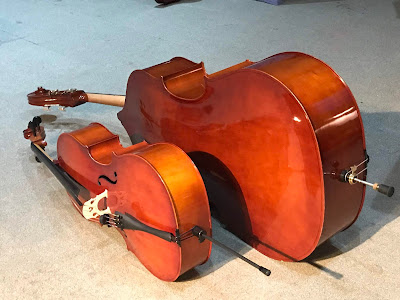Not Tragic, After All
It was 15 minutes to starting time when I hauled my string bass through the doors of the Sunrise Valley Montessori School, the first of four summer reading sessions of the Reston Community Orchestra. The first piece of music on my stand was Brahms’ “Tragic Overture.” I hoped it wasn’t a sign.
I’d signed up for this local orchestra’s “summer camp” when I was still high on my youth orchestra’s reunion performance in May. It was another chance to be part of a big symphonic sound … even though I barely knew where the notes were, even though my biceps ached from hauling a bass around in Lexington, I thought it was time to try this again.
But standing there Monday night I wasn’t so sure. The Tragic Overture wasn’t the only omen. The room was filling up with musicians — violinists, flautists, brass players and half a dozen cellists (including one who doubled as a French horn player). But no one was walking over to my little corner of the orchestral universe. And no one did. I was the lone bass player Monday night.
And … it wasn’t as tragic as I thought it would be. The notes came back into my fingers again, the lower C, the high D. The string bass part often doubled the cellos, so I mimicked my fellow lower strings as much as I could.
We played the first movement of Schubert’s Symphony Number 9 in C Major, the Brahms’ overture and a lovely waltz-like piece by a local composer who was there to hear us rehearse. The thrill was back. The tragedy … nowhere to be found.
